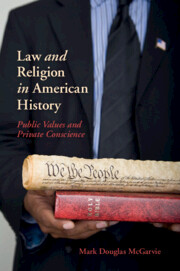Book contents
- Frontmatter
- Contents
- List of Illustrations
- Preface
- Acknowledgments
- Prologue: Colonial America Perpetuates State Religion
- 1 Revolution in Thought and Social Organization: The Legal Hegemony of Jeffersonian Liberalism, 1776–1828
- 2 A Christian Counter-revolution and a New Vision of American Society, 1828–1865
- 3 Regulating Behavior and Teaching Morals: The Uses of Religion, 1865–1937
- 4 The Rights Revolution, 1937–2015
- Epilogue: The Signifi cance of History and a Reconsideration of Original Intent
- Bibliographic Essay
- Index
1 - Revolution in Thought and Social Organization: The Legal Hegemony of Jeffersonian Liberalism, 1776–1828
Published online by Cambridge University Press: 05 July 2016
- Frontmatter
- Contents
- List of Illustrations
- Preface
- Acknowledgments
- Prologue: Colonial America Perpetuates State Religion
- 1 Revolution in Thought and Social Organization: The Legal Hegemony of Jeffersonian Liberalism, 1776–1828
- 2 A Christian Counter-revolution and a New Vision of American Society, 1828–1865
- 3 Regulating Behavior and Teaching Morals: The Uses of Religion, 1865–1937
- 4 The Rights Revolution, 1937–2015
- Epilogue: The Signifi cance of History and a Reconsideration of Original Intent
- Bibliographic Essay
- Index
Summary
Americans generally may think of their Revolution almost exclusively as a process of winning independence from Great Britain. In doing so, they vastly underestimate the transformative nature of the Revolution on American society. Americans expressed a widespread acceptance of natural rights, profoundly changing the nature of Americans’ religious beliefs and restructuring the role of the individual in society, especially relative to the authority of the government and the churches.
The idea of natural rights derived from the Newtonian construct, an intellectual understanding of the world as governed by natural laws. Natural laws applied not only in the realms of physics and biology but also to all earthly activity. People, as inherently reasonable and rational and possessed of an innate benevolence permitting the formation of society, could discover and conform to the natural laws in shaping human laws and institutions. Natural law vested humanity with inherent rights. Creating a civil society that recognized and protected these rights required reconceptualizing the nature of the state and ultimately delineating public and private spheres, with the public or governmental sphere limited in its ability to interfere with the rights of individuals in the private sphere. Inevitably, the existence of the private sphere produced a more individualistic, even an atomistic society.
Thinkers during the intellectual age known as the Enlightenment (roughly the late 1600s to the early 1800s), though captivated by the exercise of their minds in scientific experimentation and discovery, also could accept dogmatic truths spawned entirely through intuitive reasoning and use those truths as bases for deducing governing principles consistent with them. Thomas Jefferson and the signatories to the Declaration of Independence could boldly assert that they held certain “truths to be self-evident,” needing no further elucidation or substantiation. The Revolution accordingly could be fought for both equality and individual freedom, with only a slight awareness of the tension that may exist between these two goals. Ultimately, adoption of free-enterprise capitalism, initially perceived as a means of achieving both goals, focused attention on the tension between them and simultaneously resolved it in favor of personal freedom, endorsing a high degree of individualism. Law, through its protection of private rights rather than the public welfare, limited the idea of equality to legal considerations, deeming social equality inconsistent with American ideas of liberty.
- Type
- Chapter
- Information
- Law and Religion in American HistoryPublic Values and Private Conscience, pp. 1 - 47Publisher: Cambridge University PressPrint publication year: 2016

